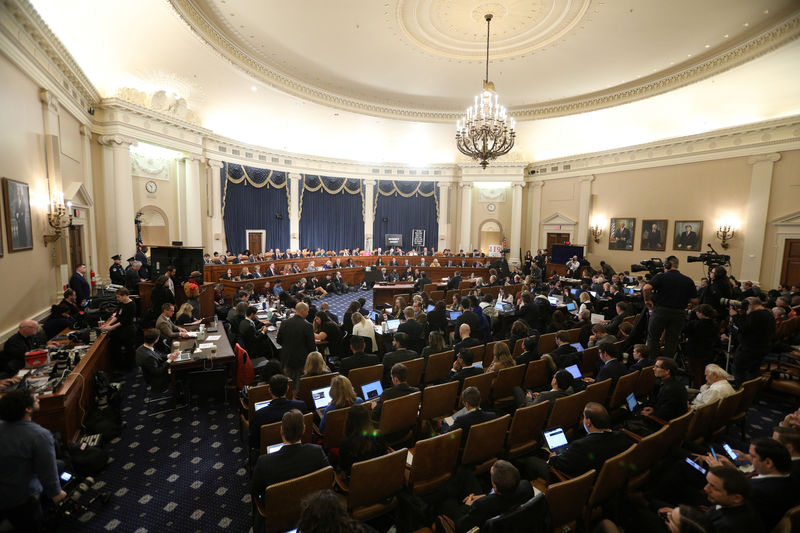By David Morgan
WASHINGTON (Reuters) - The head of a U.S. congressional panel leading the impeachment inquiry against Donald Trump on Monday accused the Republican president of putting himself before his country and violating his oath of office.
In a statement kicking off a hearing in the U.S. House of Representatives to weigh the evidence against Trump, Judiciary Committee Democratic Chairman Jerrold Nadler said there was extensive proof of wrongdoing.
"The evidence shows that Donald J. Trump, the president of the United States, has put himself before his country. He has violated his most basic responsibilities to the people. He has broken his oath," Nadler said. "I will honor mine."
The hearing on Monday is a key step before determining charges, known as articles of impeachment, that the full Democratic-controlled House is likely to vote on before Christmas.
The heart of the issue is whether Trump abused his power by pressuring Ukraine to investigate former Vice President Joe Biden, a political rival seeking the Democratic nomination to face Trump in the 2020 election, and then obstructed Congress' investigation into the scandal.
Trump denies having done anything wrong and has called the impeachment probe a hoax.
The House Judiciary panel is expected to vote by the end of the week on whether to send formal charges to the full House.
That would set up an inevitable clash with the White House and its Republican allies, who argue that Democrats are on a mission to unseat a president who did nothing to merit impeachment.
No current House Republican has come out in favor of impeaching Trump.
Representative Doug Collins, the ranking Republican on the panel, told the hearing that the impeachment process was being driven by "partisan policy differences" rather than actual evidence.
White House press spokeswoman Stephanie Grisham tweeted during the hearing that there was no evidence of wrongdoing by Trump and that "there's no obstruction whatsoever."
A vote in the House in favor of impeachment would trigger a trial in the Republican-controlled Senate where a two-thirds vote of those present would be needed to remove the president from office. A conviction is considered unlikely.
White House adviser Kellyanne Conway said the White House was not participating in the Judiciary panel's proceedings because cooperating would be "colluding with an illegitimate process."
"We're not going to do their dirty work," Conway told reporters at the White House shortly before the hearing began. "Maybe in the Senate if it's a fair trial," the White House may participate, she added.
It has been 20 years since Americans last witnessed impeachment proceedings, when Republicans brought charges against Democratic President Bill Clinton arising from a sexual relationship he had with a White House intern. He was acquitted in the Senate.
'BALONEY'
After weeks of investigation into Trump's request that Ukraine investigate Biden and his businessman son, Hunter Biden, the committee is focused on two articles charging Trump with abuse of power and obstruction of Congress.
Democrats have also accused Trump of abusing his power by withholding $391 million in security aid to Ukraine - a vulnerable U.S. ally facing Russian aggression - and holding back a coveted White House meeting with Ukrainian President Volodymyr Zelenskiy as leverage to pressure Kiev into investigating the Bidens.
But they appeared to back away from basing one of the articles of impeachment on former Special Counsel Robert Mueller's report on Russian election interference in 2016. Some Democrats believe Trump's campaign colluded with Moscow, an allegation that has been denied by Trump and was not established by Mueller's probe.
Barry Berke, a Democratic lawyer with the Judiciary Committee, alleged that Trump had engaged in repeated efforts to seek foreign influence in U.S. elections and then sought to stymie investigators who tried to uncover it.
“If, in fact, President Trump can get away with what he did again, our imagination is the only limit to what President Trump may do next or what a future president may do next, to try to abuse his or her power, to serve his own personal interest over the nation’s interest," Berke testified.
Stephen Castor, a Republican attorney, fired back by describing the impeachment inquiry as a tempest in a teapot that boiled down to a small part of Trump's July 25 phone call with Zelenskiy. It was during that call that Trump sought investigations of the Bidens and a debunked theory that it was Ukraine, not Russia, that interfered in the 2016 U.S. election.
"To impeach a president who 63 million people voted for over eight lines in a call transcript is baloney. Democrats seek to impeach president Trump, not because they have evidence of high crimes and misdemeanors, but because they disagree with his policies," Castor said.
Separately, the U.S. Justice Department's internal watchdog is expected to announce on Monday that the FBI, despite some mistakes, was legally justified in 2016 in opening its investigation into contacts between Trump's campaign and Russia, according to sources familiar with the findings.
Democrats intend to decide which articles to bring forward after Monday's hearing, which also showcased the findings of a 300-page report by Intelligence Committee Democrats that levels allegations of sweeping abuse of power against Trump.

Republicans have their own, 110-page report, which argues that the inquiry has relied on "unelected bureaucrats" who "fundamentally disagreed with President Trump's style, world view and decisions" but presented no evidence amounting to an impeachable offense.